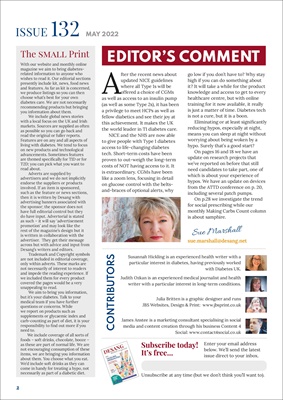
2
ISSUE 132 T
he new NICE guidelines,
regarding what diabetes
tech different people with
diabetes can access, are
going to be truly transformative.
Read in detail on p.10. Also, as an
addition to that, we have a KIT report
on three new (or improved) CGMs
that are coming our way soon, two
of which are likely to be available on
prescription from the NHS. See p.16.
It's fair to say that JDRF has long been
educating and lobbying for more
access to diabetes tech in the UK. We
take a look at its recent Pathway-toChoice
project on p.26, in our article
Making In-roads.
As we all know, technology is
not a 'cure', and nor is insulin. So,
as well as reflecting on the new
EDITOR'S COMMENT
guidelines allowing far greater access
to a wider choice of options on the
NHS, we also take a look at other
future possibilities. Can we improve
on insulin, could it ever be in some
sort of pill form? What progress
is being made in immunotherapy?
What about preventing, delaying or
even curing Type 2 diabetes? See our
article on p.18, The End of Insulin?
Then, picking up on a new but
growing science of stem cells and
gene editing, our article on p.20,
Gene Genie, looks at how far along
such techniques are as regards
treating Type 1 diabetes.
In the food section, Cheryl
Lythgoe of Benenden Health gives
her top tips for ten foods to improve
your diet, while our regular Making
Carbs Count column looks at the
wide range of vinegars and their uses.
including a recipe for home-made
cottage cheese.
sue.marshall@desang.net
Sue Marshall
Enter your email address
below. We'll send the latest
issue direct to your inbox.
Unsubscribe at any time (but we don't think you'll want to).
MAY 2022
The small Print
With our website and monthly online
magazine we aim to bring diabetesrelated
information to anyone who
wishes to read it. Our editorial sections
presently include kit, news, food news
and features. As far as kit is concerned,
we produce listings so you can then
choose what's best for your own
diabetes care. We are not necessarily
recommending products but bringing
you information about them.
We include global news stories
with a local focus on the UK and Irish
markets. Sources are supplied as often
as possible so you can go back and
read the original or fuller reports.
Features are on any and all aspects of
living with diabetes. We tend to focus
on new products and technological
advancements. Sometimes features
are themed specifically for T1D or for
T2D; you can pick what you want to
read about.
Adverts are supplied by
advertisers and we do not implicitly
endorse the suppliers or products
involved. If an item is sponsored,
such as the feature or news sections,
then it is written by Desang with
advertising banners associated with
the sponsor; the sponsor does not
have full editorial control but they
do have input. Advertorial is stated
as such - it will say 'advertisement
promotion' and may look like the
rest of the magazine's design but it
is written in collaboration with the
advertiser. They get their message
across but with advice and input from
Desang's writers and editors.
Trademark and Copyright symbols
are not included in editorial coverage,
only within adverts. These marks are
not necessarily of interest to readers
and impede the reading experience. If
we included them for every product
covered the pages would be a very
unappealing to read.
We aim to bring you information,
but it's your diabetes. Talk to your
medical team if you have further
questions or concerns. While
we report on products such as
supplements or glycaemic index and
carb-counting as part of diet, it is your
responsibility to find out more if you
need to.
We include coverage of all sorts of
foods - soft drinks, chocolate, booze -
as these are part of normal life. We are
not encouraging consumption of these
items, we are bringing you information
about them. You choose what you eat.
We'd include soft drinks as they can
come in handy for treating a hypo, not
necessarily as part of a diabetic diet.
Susannah Hickling is an experienced health writer with a
particular interest in diabetes, having previously worked
with Diabetes UK.
Judith Ozkan is an experienced medical journalist and health
writer with a particular interest in long-term conditions.
Julia Britten is a graphic designer and runs
JBS Websites, Design & Print: www.jbsprint.co.uk
James Anstee is a marketing consultant specialising in social
media and content creation through his business Content 4
Social: www.contact4social.co.uk